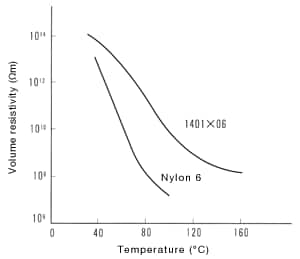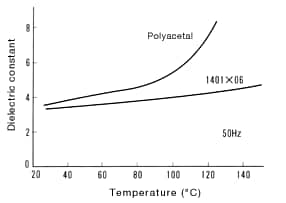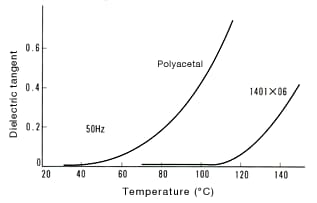- HOME
- Technische Informationen
- TORAYCON™ PBT Resin
- Electrical properties
Electrical properties
Electrical properties
Table 8 shows the general electrical properties of representative grades of TORAYCON™ PBT Polymer. Table 9 provides a comparison to other types of resins.
TORAYCON™ possesses favorable electrical properties—its superb resistance to heat and chemicals and low water-absorption make it the optimal resin for electrical and automotive components.
| Property | Unit | ASTM | 1401X06 | 1101G-30 | |
|---|---|---|---|---|---|
| Volume resistivity | Ω·m | D257 | 4×1014 | 2.5×1014 | |
| dielectric breakdown strength | MV/m | D149 | |||
| Short duration, 1mm thickness | 27 | 37 | |||
| Short duration, 3mm thickness | 17 | 23 | |||
| Dielectric tangent | 50Hz | D150 | 3.3 | 3.7 | |
| 1kHz | 3.3 | 3.7 | |||
| 1MHz | 3.3 | 3.6 | |||
| Dielectric constant | 50Hz | D150 | 0.002 | 0.002 | |
| 1kHz | 0.002 | 0.002 | |||
| 1MHz | 0.02 | 0.02 | |||
| Arc resistance | sec | D495 | 144 | 120 | |
| Volume resistivity Ω·m |
Dielectric constant 50Hz-1MHz |
Dielectric tangent 50Hz-1MHz |
Voltage resistance MV/m 1/8" thickness | Arc resistance s |
|
|---|---|---|---|---|---|
| TORAYCON™ 1401X06 | 4×1014 | 3.3 | 0.002-0.02 | 17 | 144 |
| Polyacetal (copolymer) | 1012 | 3.7 | 0.001-0.0015 | 20-23(1/16") | Molten |
| Nylon 6 | 7×1012 | 3.4-4.0 | 0.01-0.03 | 23 | 140 |
| Polycarbonate | 2×1014 | 2.96-3.17 | 0.001-0.01 | 16 | 125 |
| Modified PPO | 1015 | 2.64-2.68 | 0.0007-0.0014 | 20-22 | - |
| Diallyl phthalate | 2×1014 | 3.4-3.6 | 0.009-0.011 | 18 | 118 |
| Phenol resin | 109-1010 | 5-15 | 0.08-0.50 | 12-13 | 20 |
| Unsaturated polyester | 1010-1012 | 3.2-4.3 | 0.006-0.05 | 20 | 125 |
Ⅰ. Volume resistivity

Abbildung 19: Temperature dependence of volume resistivity
Abbildung 19 shows the temperature dependence of volume resistivity in the non-reinforced grade (1401X06). TORAYCON™ maintains favorable electrical insulating properties across a broad range of temperatures.
Table 10 shows the dielectric resistance of the glass-fiber reinforced grade (1101G-30) after causing thermal degradation. After 1,000 hours at 150°C, there is little change.
| Surface resistivity (Ω) |
Volume resistivity (Ω·m) |
|
|---|---|---|
| Before | 7 x1013 | 2 x1014 |
| After 1,000 hours at 150°C | 9 x1013 | 4 x1014 |
Measurement conditions: Voltage 100V, temperature 23°C, 50%RH
Ⅱ. Dielectric properties
Abbildungs 20 and 21 show the temperature dependence of dielectric properties in the non-reinforced grade (1401X06). TORAYCON™ undergoes little change in dielectric properties across a broad range of temperatures. Also, as shown in Table 8, frequency has little effect either.
 Abbildung 20: Temperature dependence of dielectric constant
Abbildung 20: Temperature dependence of dielectric constant Abbildung 21: Temperature dependence of dielectric tangent
Abbildung 21: Temperature dependence of dielectric tangent
Ⅲ. Dielectric breakdown strength
TORAYCON™ non-reinforced grade (1401X06) exhibits favorable dielectric breakdown strength—17 MV/m at 3 mm thickness and 27 MV/m at 1 mm thickness.
The glass-fiber reinforced grade (1101G-30) does even better—23 MV/m at 3 mm thickness.
Both the 1401X06 and 1101G-30 grades maintain nearly all their dielectric breakdown strength even after two months of thermal degradation at 150°C.
According to Underwriters Laboratories, the heat-resistant temperature of the dielectric strength in TORAYCON™ 1401X06 and 1101G-30 grades is 140°C at thicknesses of 1/8 to 1/32 inch.
Ⅳ. Arc resistance
The generation of carbonized conducting paths on a resin surface resulting from arc discharge at high voltages is an important factor in the degradation of arc resistance. As shown in Table 8, the arc resistance of 1401X06 and 1101G-30 is 144 and 120 seconds, respectively—both superlative values for a thermoplastic resin.